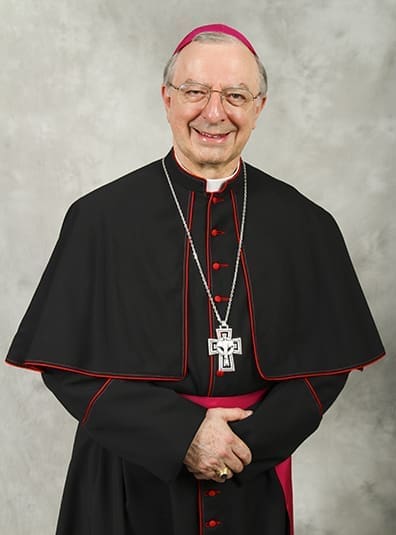Moving from spectators to participants
By BISHOP JOEL M. KONZEN, SM | Published February 18, 2021 | En Español
I have had the privilege of offering Mass recently in some of our churches that are as full as they can be under the current restrictions. It is a joy and a relief—a relief because last Easter’s experience of celebrating an Easter Vigil Mass in an empty church was a nightmare.

Bishop Joel M. Konzen, SM
We clerics can’t help but talk with each other about who will come back to the in-person Mass and when they might come. Much as our church has benefited from the phenomenon of the livestreamed Mass in our pandemic, the primal difference of participant vs. spectator is right at the heart of the matter these days. With televised sports, we are spectators for sure. Get us to an in-person game, and we can be participants on a limited scale, by virtue of cheering for our favorite team. Being a participant is always a different experience.
Reading the Act of Spiritual Communion at the altar before the distribution of holy Communion is a heart-rending exercise. I know that those who are viewing the Mass remotely want to be present and they feel their absence acutely. Moving from participant to spectator is a palpable loss. Those in their homes are, in fact, participating spiritually and not physically. Our faith as Catholics, though, is practiced in the physical context of sharing our worship with the priest, the deacon, and members of the faithful.
There is the Latin maxim “lex orandi, lex credendi,” meaning roughly that the way we pray shapes the way we believe. So, this is where some element of worry increases. Will we come to believe that our faith is practiced as well or nearly as well from a seat at home or with a broadcast on our phone? Will we cease to need the presence of others in a sacred space? Will we even get used to practicing our faith without receiving the Eucharist? Already many have been asking themselves, What does it mean to be Catholic without receiving the Eucharist? The hope has been that this privation is temporary and that in some time not far off they would be able to return to what was always second nature.
I am guessing that most of us would rather be spectators than participants when it comes to the Winter Olympics. But we want and need to be participants, not spectators, at the Mass. To see churches and outdoor Masses filled—as they can be—is a return, although gradual, to the familiar. For those who are healthy and taking precautions, their pleasure at attending Mass is visible. For those who are not yet able or ready to return because of their health conditions or concern about becoming infected, the wait is long and painful.
We are grateful for the role that technology is playing in trying to draw the remote and the in-person church together. Parishes are offering more than the weekend Mass online. They are offering opportunities for education, council meetings, check-ups with the homebound, links to online adoration of the Blessed Sacrament, and more. And so we soldier on, looking to that time when the vaccine has given more people a green light to return to the world of Eucharistic participation. In “Lumen Gentium,” that all-important document from the Second Vatican Council, we read, “Strengthened by the body of Christ in the Eucharistic communion, [the faithful] manifest in a concrete way that unity of the People of God which this holy sacrament aptly signifies and admirably realizes.”
We long to receive the Eucharist and to comprise the Body of Christ in our unity as church. Anything less will always be less. Let us pray that health will return to the land so that we can return to participate in the true Sacrifice that is our home and our hope.